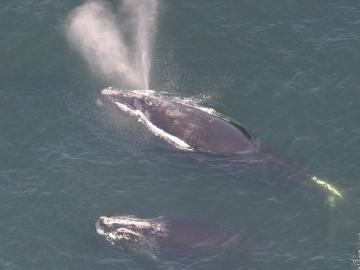
Section Branding
Header Content
Biologist Urges Comprehensive Approach To Ocean Noise
Primary Content

Federal officials are endorsing a plan to use loud underwater blasts to look for oil and natural gas off the Atlantic coast.
The plan calls for some protections for endangered right whales that give birth in Georgia and Florida waters.
Marine sound ecologist Leila Hatch of the National Oceanic Atmospheric Administration is urging a comprehensive approach to ocean noise.
She was in Savannah on Thursday to speak to the advisory panel for Gray's Reef National Marine Sanctuary.
She says the problem of ocean noise is a lot bigger than just whales.
"Animals need to be able to hear," Hatch says. "And we need to protect the conditions they need for hearing underwater."
Hatch says loud ocean noises also affect fish, seals and even crabs.
And it's not just offshore oil and natural gas exploration that's blasting into the water.
International shipping protocols and offshore military exercises also play a big role in making the ocean louder.
And that makes it harder for marine life to survive.
"The comparison there for people is, what is it like to be blind but to be in a loud industrial area or the downtown region of a big city and to be walking around and not able to gather information you need from your hearing," Hatch says.
The constant hum of background noise can reduce feeding and mating ranges.
The proposal announced Thursday does include some protections for the endangered North Atlantic right whale.
The whales give birth off the Georgia and Florida coasts during the winter months.
The Bureau of Ocean Energy Management is proposing an exclusionary zone along the whale's main migratory route.
Industry groups say they are seeking to update decades-old data on offshore energy reserves.
They say offshore oil and gas could create new jobs.
Tags: Savannah, Gray's Reef, right whales, GPBnews, endangered whales, Atlantic coast, orlando montoya, Gray's Reef National Marine Sanctuary, National Oceanic and Atmospheric Administration, ocean noise, noise pollution, marine life, Leila Hatch
